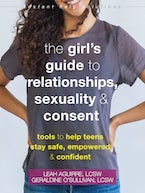By Geraldine O’Sullivan, LCSW, PPSC, coauthor of The Girl’s Guide to Relationships, Sexuality, and Consent
If your teen is going through a breakup, you may be wondering how to help them through this challenging time. This period can be filled with intense emotions for your teen—and whether you are a parent, caregiver, or therapist, it’s important to validate and support teens who are going through a heartbreak. The following are some suggested Dos and Don’ts for supporting your teen.
Don’t Minimize the Experience
It is common for adults to view teen relationships as “puppy love,” but the truth is that developmentally, teens are capable of very intense feelings of love, loyalty, trust, and heartache. It can be tempting to want to reassure teens during a breakup with placating phrases, like “You’re young, this will pass,” or, “When you’re older, you’ll see that you’ll meet someone else,” or “You’ll get over it in a few weeks.” While these attempts at reassurance may be well-intentioned or based on lived experience, teens find these comments to be minimizing of their experience and invalidating. If your teen feels that you don’t understand or recognize the significance of what they are going through, they will frequently shut down.
Do Validate Your Teen
Instead, you can validate your teen’s experience. You can offer statements such as, “It sounds like you really miss him/her/them,” or, “I know this was your first relationship and you must be really hurting right now,” or, “It seems like it was a really difficult decision to end that relationship.” By helping your teen to feel heard and understood, they will be more likely to open up to you about how they are feeling without fear of judgment.
Do Talk to Your Teen about Social Media
During a breakup, many teens struggle to create and maintain boundaries with communication with their ex. Though sometimes seeing an ex at school or in class is unavoidable, there are other situations such as watching their ex’s social media stories, viewing their location, or taking and sending screenshots of online conversations that aren’t helpful during a breakup. Talk to your teen about what level of communication they’re comfortable with, and which types of communication during a breakup may or may not be healthy for them and their progress in moving beyond the relationship.
Don’t Ignore Mental Health Warning Signs
Breakups can have a significant impact on teen mental health. In fact, for many teens who have experienced suicidal thoughts, the end of a romantic relationship can often be found as a contributing factor. Normal expressions of grief during the initial stages of a breakup include crying, venting, intense emotions, changes in sleep or appetite, or changes in socialization. But if your teen is engaging in self-harm, or if the symptoms persist or are worsening, make sure to talk to your teen about how they are feeling and coping. Don’t be afraid to ask them directly if they have experienced any suicidal thoughts—this can help teens to open up if they are struggling with this, or to reassure you if they aren’t.
Do Help Your Teen Engage in Healthy Coping Skills
In supporting a teen during a breakup, you can help them to manage their emotions by suggesting and offering healthy coping skills. This can look like buying them a journal to write their thoughts in, suggesting that they listen to some music, helping to get them out of the house by walking the dog around the block together, volunteering at a local event, or reminding them to engage in the pursuits that you know they normally enjoy. These should be gentle suggestions, and should incorporate the teen’s own strengths and coping skills.
Do Model Healthy Relationships
Teens who are dating are often figuring out what a healthy relationship may look like, and, frequently, this is based off of the relationships they have seen within their family systems. Parents, caregivers, and therapists should try to model and/or discuss with teens what qualities can be found in a healthy relationship, including respect, honesty, trust, and authenticity. Similarly, try to help your teen to understand what a healthy breakup can look like—one in which partners part ways respectfully and without emotional manipulation or abuse.
For more tips on helping teens cope effectively with a breakup and understand healthy relationships, consider referring to The Girls Guide to Relationships, Sexuality, and Consent.
Geraldine O’Sullivan, LCSW, PPSC, is a licensed clinical social worker with a pupil personnel services credential in school social work and child welfare and attendance. She currently practices as a school social worker in San Diego County, CA; where she provides mental health counseling services and crisis intervention to teens using therapeutic modalities, including cognitive behavioral therapy (CBT), motivational interviewing (MI), and solution-focused therapy. In 2022, she was awarded High School Social Worker of the Year for San Diego County. O’Sullivan is known for her research on the topic of eustress, which was published in Social Indicators Research, and is author of a literature review on the topic of teleworking published by the Southern Area Consortium of Human Services.



 2024 Peace Playbook: 3 Tactics to Avoid Clashes with Your Partner
2024 Peace Playbook: 3 Tactics to Avoid Clashes with Your Partner